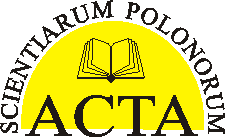Title
The effect of chloride on nutrient contents in fruits of greenhouse tomato (Lycopersicon esculentum Mill.) grown in rockwool
Autor
Andrzej Komosa, Tomasz Górniak
Keywords
chlorine, nutrient solution, fertigation, plant nutrition, biological value
Abstract
Chlorine plays important role in physiological and biochemical processes in plants. It effects significantly on biological value of yield. In Experiment I (2004–2005) the levels of 15, 30, 60, and 90 mg Cl·dm-3 but in Experiment II (2006) the levels of 30, 60, 90 and 120 mg Cl·dm-3 in the nutrient solutions on the nutrient contents and some chemical parameters of fruits of greenhouse tomato cv. ‘Grace’ grown in rockwool were studied. It was found, that increased chloride contents in the nutrient solutions increased the content of chlorine in the fruits. Increasing contents of chloride in the nutrient solution at the range of 90 to 120 mg Cl·dm-3 decreased the nitrogen and increased potassium contents in fruits. Contents of chloride in the nutrient solutions above 90 mg Cl·dm-3 enhanced the content of α-ascorbic acid and decreased the content of reducing sugars in fruits. There were no effects on the content of nitrate and nitrite contents as well as the acidity and β-carotene in fruits. The tendency of lowering the dry matter of fruits above the level of 90 mg Cl·dm-3 in the nutrient solutions was appered. It was not found the effect of increased chloride levels in the nutrient solutions on P, Ca, Mg, S, Na, Fe, Mn, Zn, Cu and B contents in the fruits of tomato.
Pages
43-53
Cite
Komosa, A., Górniak, T. (2012). The effect of chloride on nutrient contents in fruits of greenhouse tomato (Lycopersicon esculentum Mill.) grown in rockwool. Acta Sci. Pol. Hortorum Cultus, 11(5), 43-53.
Full text


